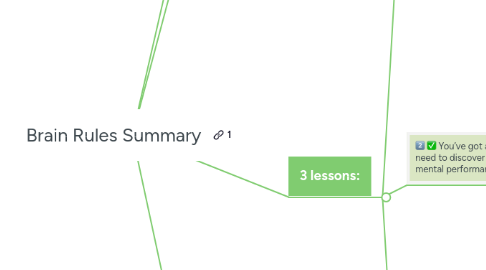
1. 1-Sentence-Summary:
1.1. Brain Rules teaches you how to become more productive at work and life by giving proven facts about how your mind works better with good sleep, exercise, and learning with all the senses.
2. Favorite quote from the author:
2.1. "One of the greatest predictors of successful aging, they found, is the presence or absence of a sedentary lifestyle." - John Medina
3. 3 lessons:
3.1. Your brain and body will work better if you exercise more.
3.1.1. Our brains today do best when we move more.
3.1.2. Your mind needs fuel from the food you eat to run properly.
3.1.3. When you exercise, all parts of your body, including your head, get better at taking in nutrients from eating.
3.1.3.1. This healthy habit also improves blood flow around the body, which helps create new blood vessels.
3.1.3.2. Vitamins and minerals can then move around more easily, and waste is easier to discard.
3.1.3.3. An example:
3.1.4. Another huge benefit of exercise is that it stimulates the creation of hormones, many of which improve your body’s tissues.
3.1.4.1. One of these is the brain-derived neurotrophic factor (BDNF), which helps in the creation of new cells.
3.1.4.2. It also keeps neurons and the connections between them healthy.
3.2. You’ve got a unique sleep pattern that you need to discover and stick to for optimal mental performance.
3.2.1. Sleep rejuvenates our body and brain
3.2.1.1. Without sleep, you begin to suffer.
3.2.1.2. Not sleeping for one week will give you a “sleep debt” the next.
3.2.1.3. If you only get six hours or less of sleep a night for five days, you’re just as cognitively impaired as if you’d gone 48-hours straight without sleeping!
3.2.2. Don't think - “I know I need to get to bed earlier”. You actually might have a sleep cycle that’s just later.
3.2.2.1. Understand this and adhere to it.
3.2.2.2. People that know their schedule and follow it generally are intellectually stronger.
3.2.3. There are 3 kinds of people:
3.2.3.1. About 10% of people are night owls that like to stay up late.
3.2.3.2. People who like to get up early are larks, and make up another 10% of the population.
3.2.3.3. Everyone else is a hummingbird, changing between staying up late and rising early.
3.2.4. To discover yours, try searching Google for a quiz that will tell you.
3.2.4.1. Once you know your type, stick to it for better mental performance
3.3. It’s easier to learn when you try to get information in both visual and audial formats at once.
3.3.1. Human's brains evolved to take in knowledge when all senses are engaged.
3.3.1.1. Do this today if you want to learn efficiently.
3.3.2. The more senses you involve when you’re learning something, the better the information will stick.
3.3.2.1. An example:
3.3.2.2. Learning isn’t as efficient when only one sense is involved because fewer parts of the brain are active.
3.3.2.3. An experiment was conducted that separated participants into three groups that were given information by different means:
3.3.2.3.1. Hearing only
3.3.2.3.2. Seeing only
3.3.2.3.3. Hearing and seeing
3.3.2.4. When it was time to remember the material they had all been shown, the group that could see and hear it performed the best by far.
3.3.2.5. If we’re multitasking then, our brains might get overloaded
3.3.2.5.1. But if you really want a specific thing to stick in your mind, try to get as many senses involved as possible in the experience
